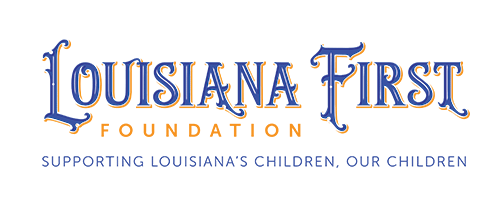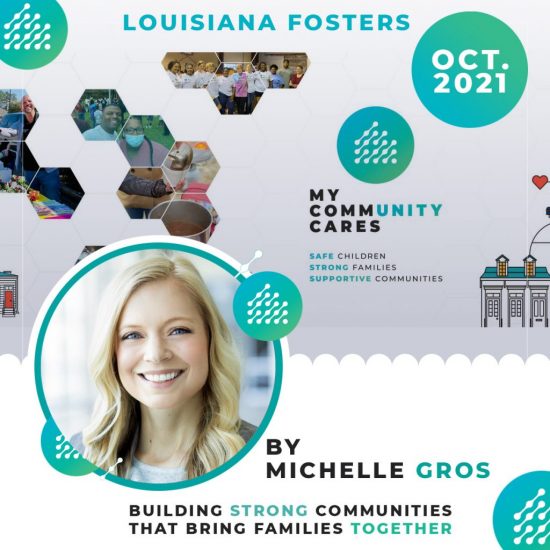My Community Cares:
Building Strong Communities
that Bring Families Together
By Michelle Gros
What do pots of gumbo, popsicles in parks, coloring books, bonfires, egg hunts, care baskets, block parties, drive-through services and resources, supporting families, foster care, advocacy, and community conversations have in common? My Community Cares (MCC)! MCC is a community-driven approach that strives to bring together community members and agencies committed to a shared vision of promoting child and family well-being and ensuring that families can access the support they need to reach their full potential. The vision of MCC is for children and families to have access to services, activities, programs, resources, and supports in the communities where they live.
MCC was developed in response to the 2018 Child and Family Services Review (CFSR) conducted on Louisiana’s child welfare system. Inspired by the federal Children’s Bureau’s new vision to shift from a reactive system to one centered on family strengthening, Louisiana judges and legal and child welfare stakeholders chose to stir the pot and try something different than a one-size-fits-all approach to preventing children from entering foster care. Stakeholders were impassioned to co-design strategies with community members to find ways to serve families before they became entangled with the court and foster care systems. As a result, the Court Improvement Program (CIP) of the Louisiana Supreme Court, Pelican Center for Children and Families, and local courts partnered with the Department of Children and Family Services (DCFS), Louisiana Children’s Trust Fund, Louisiana Children’s Justice Act (CJA) Task Force, Casey Family Programs, many other agencies, parents and families with lived experience with the child welfare system, and community members to implement MCC.
Louisiana’s child welfare data showed that many families involved with the child welfare system historically live within the same neighborhoods. Stakeholders agreed to seek the voice of residents in these neighborhoods to find out what community-based programs and supports they felt families needed to access critical services that were supportive, racially equitable, culturally relevant, and built on the strengths of their community. Four parishes with high numbers of children entering foster care were chosen to pilot MCC: Caddo, East Baton Rouge, Livingston, and Rapides. Fourteen priority neighborhoods were identified within those four parishes.
Over the past two years, MCC has partnered with thousands of families in these communities to assess opportunities and challenges and co-design solutions with them to prevent children from entering or remaining in foster care. While each community took its unique approach to implement MCC, there are key tenets across the parishes:
- Guiding Principles:MCC is premised on the fact that communities can be self-healing and know solutions to their unmet needs and problems best. Each community has unique barriers to accessing services, activities, programs, resources, and supports, and one prevention approach will not work for all communities.
- Teaming Structure:MCC neighborhood, parish, and state teams meet regularly to actively listen to and support one another, improve communication between community members and agency partners, identify and remove barriers to quality services, advocate for change, promote racial equity, and build a network of services, activities, programs, resources, and supports unique to each community.
- Leadership:MCC is led by community members and agency partners.
- Community membersinclude families with lived experience with the child welfare system as well as individuals invested in the health of the community where they live, such as residents, business owners, service providers, clergy, and others unique to each community. Some community members—and specifically from communities of color that have been marginalized—conveyed their mistrust of government agencies and service providers. They further expressed that they are often the last ones to know when someone or something comes into their neighborhood to “save” them; and have conveyed that by the time they know about it, it is too late for their input and there is then a clear struggle to truly make an impact. Thus, finding trusted and credible community members of the community itself to lead within MCC is critical—and takes time.
- Agency partnersinclude judges, Family in Need of Services (FINS), CASA (Court Appointed Special Advocates), attorneys, DCFS, service providers, schools, emergency responders, healthcare providers, non-profit organizations, local government, etc. Judicial leadership is crucial to MCC. Judges are in a unique position to observe and understand the needs of families and convene and support the communities they serve to influence positive community change. The role of DCFS is important because it is responsible for the safety and well-being of children in communities and working in partnership with other community entities to ensure the availability of services and supports.
- A MCC Parish entitycoordinates the work with community members and agencies in each community, including Step Forward of the Community Foundation of North Louisiana in Caddo Parish, MetroMorphosis in East Baton Rouge Parish, Empower 225 in Livingston Parish, Fostering Community in Rapides Parish, and United Way of Acadiana in Lafayette Parish.
- Strategies:Each community has its own strategies, but overall MCC strategies include: hosting and supporting a variety of community events and conversations to engage community members in identifying needed supports; conducting ongoing assessments of community strengths, challenges, and opportunities; using information shared by community members through listening circles, community conversations, and activities as well as data collected by parishes and the state to inform decisions and track outcomes; implementing strategies recommended by the community and providing a way for information, strategies, and solutions to flow between the neighborhood, parish, and state teams to meet the unique needs of communities; and advocating for system changes as needed.
- Central Point of Contact: MCC serves as a single point of contact in communities for families in need of supports before (or when) crisis hits. MCC connects families to other families and/or agencies for support and resources as well as connects agencies with other agencies to improve coordination, quality, and availability of services and referrals. Connections are made to meet basic needs such as food, shelter, and clothing. Additional help is provided to identify root contributors of “the crisis” and find resources for employment, housing stability, parenting support and education, financial management, mental health, etc.
Each parish has experienced its own unique wins, including:
- Intentional processes and programs are being created with local government, schools, FINS, courts, law enforcement, and DCFS to support parents, caregivers, and children. For example, in Rapides Parish in-school mental health programs have expanded from nine to 23 schools, and in Caddo Parish, the school district has adopted a trauma-informed lens and plans to place TBRI® (Trust-Based Relational Intervention) practitioners in all 64 schools.
- For example, in Livingston and East Baton Rouge Parishes, communities are overcoming barriers to healthcare in neighborhoods with limited access to public transportation by building strategic partnerships with local healthcare providers.
- Listening circles and community gatherings are being hosted for youth in Rapides parish.
- Trauma support and TBRI® trainings are being provided to parents, caregivers, and children in Caddo Parish through collaborations between the Caddo Parish Juvenile Court and Volunteers for Youth Justice;
- Consistent gatherings for parents and caregivers are being held in East Baton Rouge Parish to discuss successes and challenges of raising children, support one another, and advocate together for the communities in which they live;
- In Livingston Parish, MCC partners have engaged with the community through: a drive-through event where needs assessments were completed to connect families with services and supports and invite them to be an advocate for their community; a “back to school” bash that included a petting zoo, balloon animals, free school supplies, and parent support; weekly popsicles for children in parks and support information for parents; and partnering with local law enforcement to provide car seats and car seat safety training for families in the community; and
- The My Community Cares Connection Portal(MCCCP) has been launched to connect community members and agencies to concrete supports and resources and provide a place to share community events, trainings, and collaboration opportunities.
MCC plans to expand across all Louisiana parishes in the coming years and continue to see a decrease in the number of hotline reports made to DCFS, Child Protective Service investigations, and ultimately, the number of children entering foster care.
We are better together, and together we can strengthen Louisiana children and families!
For more information on My Community Cares, contact:
- Michelle Gros, Chief Operations Officer, Pelican Center for Children and Families, at specialprojects@pelicancenter.org
- Jenny Forrest, MCC State Coordinator, Pelican Center for Children and Families, at mcc@pelicancenter.org
- Melody Weaver, Special Projects Consultant and MCCCP Administrator, Pelican Center for Children and Families, at spadmin@pelicancenter.org
Supporting Articles:
- https://cbexpress.acf.hhs.gov/index.cfm?event=website.viewArticles&issueid=209&articleid=5383
- https://cbexpress.acf.hhs.gov/index.cfm?event=website.viewArticles&issueid=215§ionid=2&articleid=5536
Bio: Michelle Gros is the Chief Operations Officer for the Pelican Center for Children and Families, where she assists in implementing the Louisiana Court Improvement Program on behalf of the Louisiana Supreme Court. She is passionate about improving the foster care system and has personal experience as a foster parent and adoptive parent. Michelle and her husband, Rob, were recognized by the Congressional Coalition of Adoption Institute as a 2018 Angels in Adoption Honoree. She graduated in 2003 with a Bachelor of Science in Family, Child, and Consumer Sciences with a concentration in Human Services Management and a minor in Sociology from Louisiana State University; 2005 with a Masters in Christian Education from New Orleans Baptist Theological Seminary; and, 2018 with a Juris Doctorate from Southern University Law Center.


